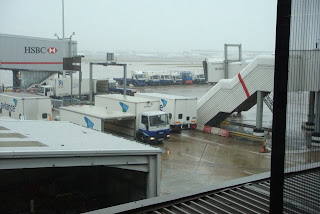Today felt like a typical day back in the States, and not in a good way. For about a month before we left, we spent our days in a state of moderate frustration as we tried to get all of our paperwork, travel details, packing, etc. done in time for our imminent departure. Nothing seemed to work the way it should, or as quickly as we needed it to. Now, we need to set up all those things afresh, and it has not been a pleasant process. Our pain, recast for your amusement here:
Yesterday we laughed about the small amount we were able to accomplish in three hours. Today we spent almost as much time and accomplished nothing! We tried to open a bank account and ran into endless roadblocks. Here is a condensed version of our conversations with the banker:
Andrew: I would like to open a bank account. Here is my passport, visa, letter of introduction, proof of acceptance to UCT, and letter from Rotary committing funds.
Banker: Do you have proof of residence? A lease, or utility bill?
Andrew: No, we don't have an apartment yet. We are staying with some friends temporarily.
Banker: They can sign an affidavit certifying that you are staying in their residence.
Sonia: I will sign for them.
Banker: I need a utility bill proving that you live at your address.
Sonia: I have an account at this bank, so you already have proof that I live at that address.
Banker: That doesn't count. It could be from a different bank, but not from here.
(Pause while we leave the bank and go to the office of Sonia's investment firm, which gives her a letter.)
Sonia: Here is a letter from my investment firm certifying that I live at my address, signed and notarized.
Banker: That won't count. We need a utility bill.
Sonia: What if all of our utility bills come in my husband's name?
Banker: Then he will need to sign the affadavit. Also, he will need to bring his identification card.
Sonia: His identification card was stolen three years ago. Can he bring a passport?
Banker: No, just go to the police station and have them give him an affadavit.
You get the idea. The moral of the story today, and for the last month, and probably from some time to come, is “ 'n boer maak altyd 'n plan” -- literally “a farmer always makes a plan.” The idea is that rather than sitting around being frustrated, we should be resourceful, think outside the box, and find a way no matter how long it takes. As people who believe that God cares about every detail of our lives, we hope to make prayer an integral part of this process, not just an afterthought after we have tried everything else. So tonight we will pray for a way to make this all work...and then we'll talk to our lawyer friend.
 Newspapers here in South Africa have an interesting marketing strategy. In addition to having people sell the newspapers on street corners (they walk up and down the rows of traffic waiting at a red light), they have cardboard signs on telephone poles and lamp posts. These signs change daily, showing a new headline from that day's newspaper. So even if you don't subscribe to a newspaper or get news from the radio, television or internet, simply by driving around the neighborhood you can get an idea of what's going on. Here's one example:
Newspapers here in South Africa have an interesting marketing strategy. In addition to having people sell the newspapers on street corners (they walk up and down the rows of traffic waiting at a red light), they have cardboard signs on telephone poles and lamp posts. These signs change daily, showing a new headline from that day's newspaper. So even if you don't subscribe to a newspaper or get news from the radio, television or internet, simply by driving around the neighborhood you can get an idea of what's going on. Here's one example:









 Today we enjoyed a luxurious Sabbath of sleep and good food and fellowship at the Bliss' house.
Today we enjoyed a luxurious Sabbath of sleep and good food and fellowship at the Bliss' house.










.jpg)











